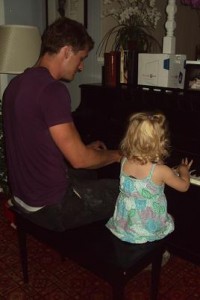The last time I was in England visiting our son Hans and his young family, we began chatting about the Garden of Eden. We wondered aloud about its only residents, Eve and Adam, the mother and father of the entire human race. What did they look like? Were they tall? Small? Dark skinned? Light? Were they children? Teens? Twenty-somethings?
 Enjoying our discussion, we talked about their language. Without ever pondering this before, I’ve always assumed they spoke English, a thought that’s comical now. But what, then, did they speak? Was it Hebrew? Greek? Aramaic? Probably not.
Enjoying our discussion, we talked about their language. Without ever pondering this before, I’ve always assumed they spoke English, a thought that’s comical now. But what, then, did they speak? Was it Hebrew? Greek? Aramaic? Probably not.
Most likely it was a language that doesn’t exist today. Hans got me laughing when he said, “Maybe it was the language of clicks and whistles,” and then gave me his best impression. We agreed it was too late for either of us to master that one.
All of our children have studied foreign languages in school, but most can’t use them beyond Taco Bell or The Olive Garden. Although a two year old can become fluent in any language in about a year, the rest of us need multiple years to speak even a little. The older we get, the harder it is to make a foreign vocabulary “stick.”
It’s even difficult (and can be risky) traveling in a foreign country where we can’t read signs or understand people. Mary and I once got so lost in Sweden we thought we’d have to spend the night under a bridge. Although we had a car, a full gas tank, Swedish money, and two fairly good brains, trying to follow verbal directions without the language was hopeless.
I’ve so loved listening to my grandchildren learn to speak between their first and second birthdays. I remember the day a bunch of us walked the four blocks to my mailbox with a 22-month-old Skylar running circles around the rest of us. Somebody said, “It’s a little chilly.”
Skylar immediately picked up on it. “It’s a little chilly, Mommy. It’s a little chilly, Weezi. It’s a little chilly, Gitta. It’s a little chilly, Midgee.” As she skipped along, she repeated these new words 20 times over until we were stumbling along the road with laughter. But Skylar was simply learning a language.
 No doubt heaven will have its own language made up of words none of us could ever find in an earthly dictionary. When we first arrive in that new “country,” however, and are still learning to speak the language, surely the Lord will make a way for us to communicate with each other. Maybe it’ll be by way of the one language that’s universal even here on earth : music. If so, that’ll factor in nicely with singing our praises to God.
No doubt heaven will have its own language made up of words none of us could ever find in an earthly dictionary. When we first arrive in that new “country,” however, and are still learning to speak the language, surely the Lord will make a way for us to communicate with each other. Maybe it’ll be by way of the one language that’s universal even here on earth : music. If so, that’ll factor in nicely with singing our praises to God.
“Make a joyful noise unto the Lord, all ye lands. Serve the Lord with gladness.” (Psalm 100:1-2)
Praising and Praying with Mary
- I praise God for the perfect peace he gave me during today’s infusion. (Lam. 3:57) Please pray against nausea tonight and tomorrow, which is only mild so far, PTL.
- I’m thankful my feeding tube feels a little better today.
